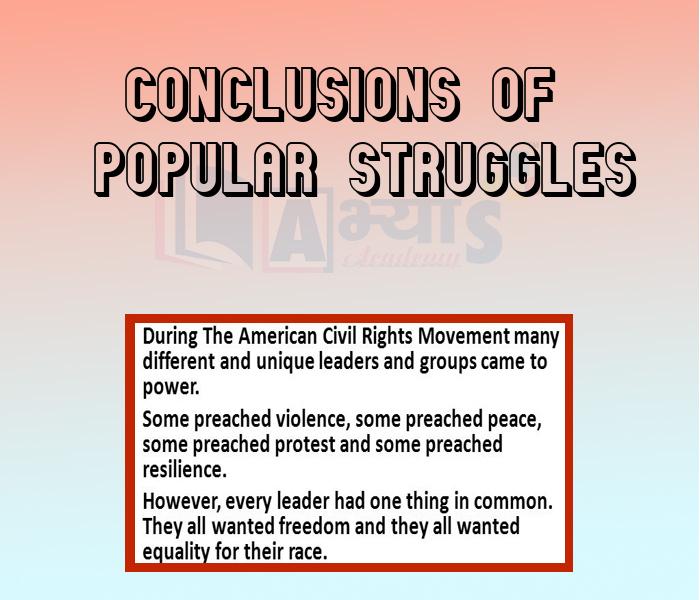Conclusions Of Popular Struggles










Conclusions Of Popular Struggles
Democracy And Popular Struggles: Both the struggles in Nepal and Bolivia were successful but their impact was different. The movement of Nepal was to establish democracy but the struggle in Bolivia was against one specific policy the government. Inspite of this difference, both the stories share some elements which are relevant to the study of the past and future of democracies. Both the struggles involved mass mobilisation. Both instances involved critical role of political organisation.The following important conclusions can be drawn from these two struggles :-
Mobilisation and Organisations: In a democracy, several different kinds of organisations work behind any big struggle. These organisations play their role in two ways.
In Nepal, the call for indefinite strike was given by the Seven Party Alliance (SPA). The mass rising was joined by the Nepalese Communist Party (Maoist). Many organisations other than political parties were also involved in this movement. These were labour uniions, organisation of the indigenous people, teachers, lawyers, human rights groups, etc.The Bolivia Water War was led by an organisation called FEDECOR (Federation Departmental Cochabamba de Regantes) which comprised of local professionals, including engineers and environmentalists. It supported by a federation of farmers, who relied on irrigation factory workers unions middle-class students, homeless street children and also by the Socialist Party. The Socialist Party came to power in Bolivia in 2006.
# Pressure groups :- A pressure group is such a group of people having common interests which exerts pressure on the government for the fulfilment of its interets.
# Movement groups :- Groups involved with movements are called "Movement Groups " . they include a very wide variety movement groups which are both specific and general in order to achieve desired goals .
Students / Parents Reviews [10]
One of the best institutes to develope a child interest in studies.Provides SST and English knowledge also unlike other institutes. Teachers are co operative and friendly online tests andPPT develope practical knowledge also.

Aman Kumar Shrivastava
10thMy experience with Abhyas is very good. I have learnt many things here like vedic maths and reasoning also. Teachers here first take our doubts and then there are assignments to verify our weak points.

Shivam Rana
7thIt was good as the experience because as we had come here we had been improved in a such envirnment created here.Extra is taught which is beneficial for future.

Eshan Arora
8thBeing a parent, I saw my daughter improvement in her studies by seeing a good result in all day to day compititive exam TMO, NSO, IEO etc and as well as studies. I have got a fruitful result from my daughter.

Prisha Gupta
8thAbhyas is a complete education Institute. Here extreme care is taken by teacher with the help of regular exam. Extra classes also conducted by the institute, if the student is weak.

Om Umang
10thA marvelous experience with Abhyas. I am glad to share that my ward has achieved more than enough at the Ambala ABHYAS centre. Years have passed on and more and more he has gained. May the centre flourish and develop day by day by the grace of God.

Archit Segal
7thIt was a good experience with Abhyas Academy. I even faced problems in starting but slowly and steadily overcomed. Especially reasoning classes helped me a lot.

Cheshta
10thMy experience with Abhyas academy is very good. I did not think that my every subject coming here will be so strong. The main thing is that the online tests had made me learn here more things.

Hiya Gupta
8thAbout Abhyas metholodology the teachers are very nice and hardworking toward students.The Centre Head Mrs Anu Sethi is also a brilliant teacher.Abhyas has taught me how to overcome problems and has always taken my doubts and suppoeted me.

Shreya Shrivastava
8thMy experience was very good with Abhyas academy. I am studying here from 6th class and I am satisfied by its results in my life. I improved a lot here ahead of school syllabus.
